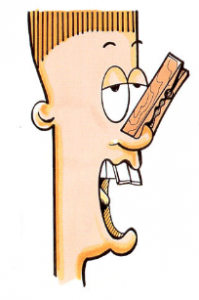When we are born our instinctive breathing is through the nose. The nose has special features that clean and add humidity to the air to protect the lungs too. But if there are obstructions in our nose, or upper part of the airway we will open our mouth and start breathing thorough it. This his how mouth breathing starts, but if the obstruction does not clear, mouth breathing h as many detrimental effects for the mouth and the nose alike.
as many detrimental effects for the mouth and the nose alike.
Since the nose is not functional, it does not develop properly and neither is the upper jaw. This will lead to a sunk in upper jaw with a narrow palate. The lower jaw will hang open to allow the air to pass through, making the muscles weak and elongated.
The tongue plays a large part in influencing the growth of the upper jaw and base of the skull. It should ideally be in contact with the roof of the mouth at rest and during swallowing. But for those breathing through the mouth, the tongue drops to the floor of the mouth and does not make contact with the upper jaw at all. Causing to all children who are habitual mouth-breathers, to have a bad bite.
Mouth breathing should be treated early in life to prevent the changes to the upper and lower jaws from becoming permanent as we mature.
If you or your child are mouth breathers or have misaligned teeth it is important to have the condition examined as soon as possible. If you would like more advice about the right position of the teeth , please ask Dr. Kaufman or schedule an appointment for a consultation.